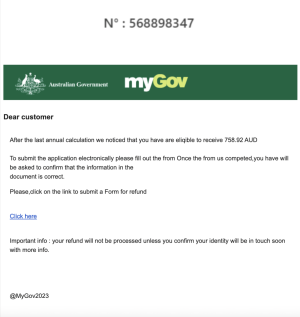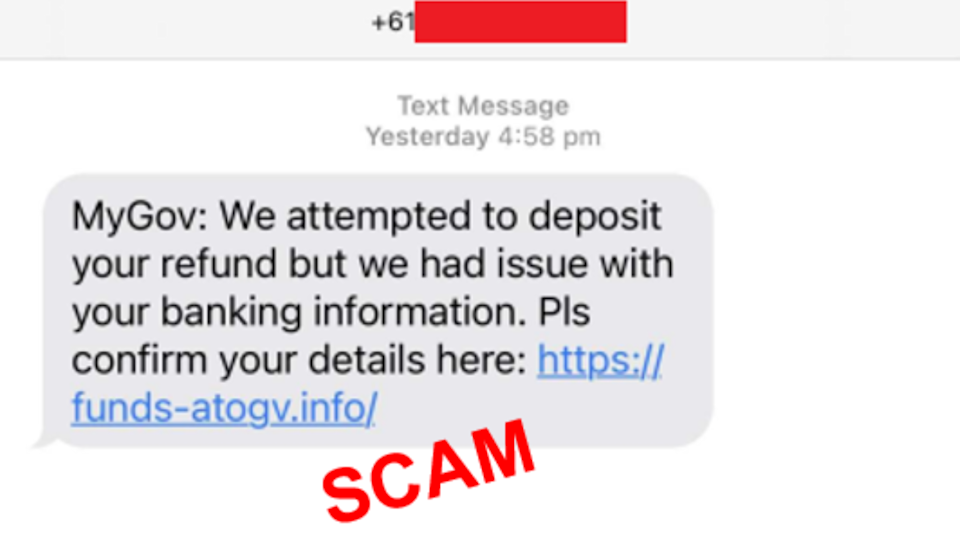New Scam on the Rise: Australians Warned to Stay Vigilant Against ‘myGov Refund' Scheme
By
- Replies 33
There's no denying that receiving a surprise refund or cashback is a feeling that many of us love. Whether it's from a store, a credit card company, or a service provider, getting some extra money back into our pockets can be a welcome surprise.
In recent years, cashback offers have become increasingly popular, with more and more businesses offering them as a way to incentivise customers to make purchases or use their services.
While cashback schemes are gaining popularity, receiving surprise rebates from government agencies can still raise concerns and lead to questions about their legitimacy.
In fact, one of our members recently notified us that she had received an email from an account claiming to be myGov, informing her that she was entitled to a refund.

'Just received this and it looks genuine but how do I check it out without a lot of problems?' SDC member Rita asked.
'I don't know why I would be getting of any sort from the Government.'
Well, folks, the bad news is that it appears that this email may be another ploy for scammers to target unsuspecting Australians…
Scamwatch has issued a warning to stay vigilant and watch out for emails or messages that appear to be from myGov claiming that you are eligible for a refund or rebate.
The group also advised against clicking through any links included in a suspicious email or message.
Reports of myGov scams have been on the rise, with a 160% increase in reported scams in January 2023 compared to December 2022.
To illustrate the type of scam messages they’re seeing, Scamwatch used two examples that they recently encountered.
The first was a text message which reads: 'MyGov: We attempted to deposit your refund but we had issue [sic] with your banking information. Pls [sic] confirm your details.'
However, the message is suspicious due to its poor grammar and spelling.

The same goes for an email example they presented, which also came with a myGov logo and claimed that the potential victim was eligible for a $758.92 refund.
The email reads: ‘After the last annual calculation we noticed that you are eligible to receive a sum of $758.82 AUD,.’
‘To submit the application electronically please fill out the form. Once completed you will be asked to confirm that the information in the document is correct.’
Here are some additional warning signs you should watch out for in any messages claiming to be from myGov:
• It's addressed to 'Dear Customer'
• The email address does not appear to be related to myGov
• There is an urgent call to action
• You’re asked for personal information (even if it says it’s for 'verification purposes')
• You’re asked to make a payment to receive a refund
The bottom line here, members, is to use your best judgement: if you’re ever in doubt of the legitimacy of a message claiming to be from myGov, ignore it.
Not only is it likely a scam, but it’s not worth the risk of clicking on a link or getting caught – especially with your personal information on the line.

If you believe you may have been the victim of a scam, or you see any other suspicious activity emails or texts from a myGov address, contact Scamwatch immediately and report the situation. They will be able to provide assistance.
Stay safe out there, folks! Also, please consider sharing this article with your friends and family so they can be informed of this ploy too. A huge thank you again to member Rita for bringing this to our attention.
In recent years, cashback offers have become increasingly popular, with more and more businesses offering them as a way to incentivise customers to make purchases or use their services.
While cashback schemes are gaining popularity, receiving surprise rebates from government agencies can still raise concerns and lead to questions about their legitimacy.
In fact, one of our members recently notified us that she had received an email from an account claiming to be myGov, informing her that she was entitled to a refund.

A screenshot of the email that SDC member Rita received from an account purporting to be myGov. Credit: Seniors Discount Club/Supplied.
'Just received this and it looks genuine but how do I check it out without a lot of problems?' SDC member Rita asked.
'I don't know why I would be getting of any sort from the Government.'
Well, folks, the bad news is that it appears that this email may be another ploy for scammers to target unsuspecting Australians…
Scamwatch has issued a warning to stay vigilant and watch out for emails or messages that appear to be from myGov claiming that you are eligible for a refund or rebate.
The group also advised against clicking through any links included in a suspicious email or message.
Reports of myGov scams have been on the rise, with a 160% increase in reported scams in January 2023 compared to December 2022.
To illustrate the type of scam messages they’re seeing, Scamwatch used two examples that they recently encountered.
The first was a text message which reads: 'MyGov: We attempted to deposit your refund but we had issue [sic] with your banking information. Pls [sic] confirm your details.'
However, the message is suspicious due to its poor grammar and spelling.
A sample ‘scammy’ text message that Scamwatch warned us to look out for. Credit: Scamwatch.
The same goes for an email example they presented, which also came with a myGov logo and claimed that the potential victim was eligible for a $758.92 refund.
The email reads: ‘After the last annual calculation we noticed that you are eligible to receive a sum of $758.82 AUD,.’
‘To submit the application electronically please fill out the form. Once completed you will be asked to confirm that the information in the document is correct.’
Here are some additional warning signs you should watch out for in any messages claiming to be from myGov:
• It's addressed to 'Dear Customer'
• The email address does not appear to be related to myGov
• There is an urgent call to action
• You’re asked for personal information (even if it says it’s for 'verification purposes')
• You’re asked to make a payment to receive a refund
The bottom line here, members, is to use your best judgement: if you’re ever in doubt of the legitimacy of a message claiming to be from myGov, ignore it.
Not only is it likely a scam, but it’s not worth the risk of clicking on a link or getting caught – especially with your personal information on the line.
Key Takeaways
- Aussies have been warned to be wary of myGov scams.
- Scamwatch reported a 160 per cent increase in myGov scams reported in January.
- Common scam examples include text messages and emails that say you are 'eligible for a refund or rebate'.
- Scamwatch reminds Aussies to never click any hyperlink in a suspicious email or text.
If you believe you may have been the victim of a scam, or you see any other suspicious activity emails or texts from a myGov address, contact Scamwatch immediately and report the situation. They will be able to provide assistance.
Stay safe out there, folks! Also, please consider sharing this article with your friends and family so they can be informed of this ploy too. A huge thank you again to member Rita for bringing this to our attention.







